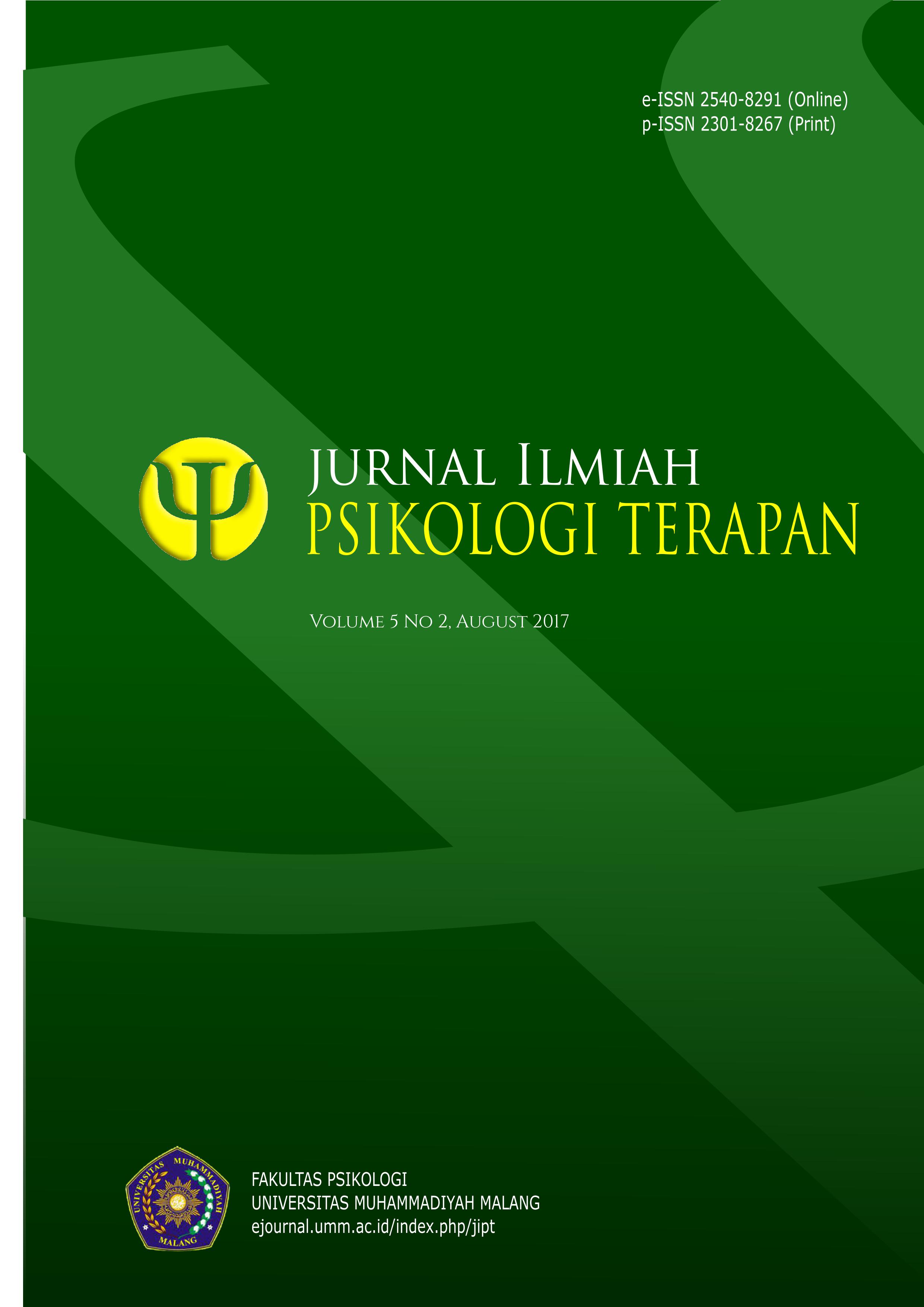GRATITUDE DAN PSYCHOLOGICAL WELLBEING PADA REMAJA
DOI:
https://doi.org/10.22219/jipt.v5i2.4857Keywords:
Gratitude, Psychological well-being, AdolescentsAbstract
Gratitude dan psychological well-being merupakan aspek emosi positif yang ada dalam individu. Individu yang memiliki rasa bersyukur karena mampu menyadari bahwa dirinya banyak menerima kebaikan, penghargaan baik dari Tuhan, orang lain dan lingkungan sekitarnya. Sedangkan individu yang memiliki psychological well-being ketika Ia mampu menerima dirinya, membentuk hubungan yang hangat, memiliki kemandirian, mengontrol lingkungan eksternal, memiliki arti dalam hidup serta merealisasikan potensi dirinya secara kontinyu. Tujuan penelitian ini adalah untuk mengetahui pengaruh Gratitude terhadap Psychological well being pada remaja. Penelitian menggunakan desain kuantitatif non eksperimen korelasional dua variabel. Teknik sampling yang digunakan dalam penelitian ini adalah menggunakan teknik cluster sampling. Teknik pengumpulan data dalam penelitian ini menggunakan skala Ryff’s psychological well-being scale dan The Gratitude Questionnaires Six Item Form (GQ-6). Analisa data menggunakan metode analisa korelasional. Hasil penelitian menunjukkan bahwa tidak ada hubungan yang signifikan antara gratitude dan psychological well-being pada remaja (r=0,012, p=0,865).
Kata kunci: Gratitude, psychological well-being, remaja.
Gratitude and psychological well being is a positive emotional aspect in every individual. People have gratitude on their self because they aware to get something good in every situation, a good appreciation from God and another people. Meanwhile, people who have psychological well being when they have self acceptance, positive relation to other people, have autonomy and mastering environment, have purpose in life and realizing their potential. The purpose of this study is to know the effect of gratitude towards psychological well being in adolescents. The research design used quantitative non-experimental study, correlating 2 variables. The sampling technique using cluster sampling. The data collected by using Ryff’s Psychological Well-Being Scale formed by Caroll D. Ryff (1989) and The Gratitude Questionnaires Six Item Form (GQ-6) be in the form of Likert Scale by McCullough (2002). The data analyzed by correlational analysis method. The result of this study show that there is no correlation between gratitude and psychological well-being in adolescent (r = 0,012; p=0,865).
Keywords: Gratitude, psychological well-being, adolescents
Downloads
Downloads
Published
How to Cite
Issue
Section
License
Authors who publish with Jurnal Ilmiah Psikologi Terapan agree to the following terms:
- For all articles published in Jurnal Ilmiah Psikologi Terapan, copyright is retained by the authors. Authors give permission to the publisher to announce the work with conditions. When the manuscript is accepted for publication, the authors agree to automatic transfer of the publishing right to the publisher.
- Authors retain copyright and grant the journal right of first publication with the work simultaneously licensed under a Creative Commons Attribution-ShareAlike 4.0 International License that allows others to share the work with an acknowledgment of the work's authorship and initial publication in this journal.
- Authors are able to enter into separate, additional contractual arrangements for the non-exclusive distribution of the journal's published version of the work (e.g., post it to an institutional repository or publish it in a book), with an acknowledgment of its initial publication in this journal.
- Authors are permitted and encouraged to post their work online (e.g., in institutional repositories or on their website) prior to and during the submission process, as it can lead to productive exchanges, as well as earlier and greater citation of published work (See The Effect of Open Access).

This work is licensed under a Creative Commons Attribution-ShareAlike 4.0 International License.











